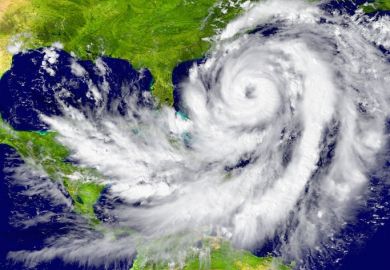We enjoy conference season as much as any other academic. All those stimulating conversations with strangers through the fog of caffeine and jet lag in beautiful, far-flung locations are one of the major perks of academic life.
But these days, the pleasure is dulled by pangs of guilt about the associated climate cost of getting there. This is especially true when the conference is about the climate emergency and sustainability, and you might argue that it is hypocritical to fly to such events. But these are complicated issues.
As everywhere in life, there is no single solution to the environmental impact of academic travel. We need systemic changes, implemented by institutions, funders, conference organisers and others. It’s not something one academic can shift simply through limiting their own work trips.
Campus resource: Charting a shared path to net zero universities
Yet an academic has more control over travel than over other interventions to reduce emissions, such as making a university’s buildings more efficient or investing in renewables. Ten per cent of emissions for the entire further and higher education sector in Scotland comes from business travel, and air travel is responsible for 90 per cent of this. It’s an important area to target and one where many individuals together, led by clever policy, will make a difference.
If you, like us, know that offsetting flights is too little too late, you may wonder what can really be done, short of regulating who can travel and where. We want to share a more egalitarian and effective intervention: climate income.
Also known as carbon fee and dividend, this idea is already in operation in a few countries, so let’s not dismiss it as too complicated for a university. A fee is imposed on the consumption of fossil fuels – so everyone indirectly pays for the “privilege” of polluting the atmosphere – and all revenue is shared among citizens. Adults in Austria received €250 (£214) in 2022 and in some Canadian provinces it’s roughly C$500 (£295) annually for someone living alone. Those with a lower impact on the climate get, in effect, to keep more of that money by paying less for the right to pollute.
A similar scheme could work in higher and further education institutions, reducing emissions without prescribing who can and who cannot travel for work.
Imagine that a charge of £100 was imposed for one tonne of carbon dioxide equivalent (tCO2e) emitted as a result of business travel. From Scotland, a return flight to Australia would incur a fee of £500 and a round trip to Rome by plane would be £60, while a return train ride to London would cost only £5. The university’s carbon fee “pot” would increase by the corresponding amount every time travel was booked. In the case of the University of Edinburgh, which estimated that its business travel produced approximately 12,000 tonnes of CO2e in 2014-15, this should raise £1,200,000 if travel behaviour remained unchanged.
At the end of the year, the revenue from the carbon fee would be distributed in equal payments to all staff budgets; in Edinburgh’s case, each would receive about £100. Those who did little travel would come out well ahead, earning them extra funding for training or (slow) travel to build their networks. Those with two medium-haul flights would break even, and those with a long flight would pay more than they got back.
The carbon fees would be paid out of institutional budgets, such as the travel budget for the student recruitment team, the research allowance for a PhD student or the research budget for a bigger project. This would avoid leaving anyone personally out of pocket for doing what they consider their jobs to require.
There may be barriers to overcome when seeking to pay a climate charge out of certain budgets, but these technical issues would vary by institution, school, research council and team and would be best solved at those levels. Applied creatively, climate income could be implemented by individual departments or schools to give the university a framework to distribute effort in a fair and transparent way.
The bigger question is how large the fee would need to be to provide a genuine incentive for people to fly less. A few hundred pounds can be a drop in a lab budget, but at lower career levels it can mean a lot. Moreover, the climate income dividend would be paid into staff members’ unrestricted budgets. Having even small amounts of such “soft money” is highly appealing.
Equally, because of the revenue recycling involved in the scheme, the carbon pricing can be substantially higher than assumed here without harming those early in their careers or with smaller budgets.
Travel climate income is about everyone working together to reduce emissions, and that is what’s required to achieve the transformative adaptation now being called for by the Intergovernmental Panel on Climate Change. We’d like to imagine, for instance, that a travel climate income scheme would make it more common for the big international “can’t-miss” conferences to have regional hubs, cleverly linked by videoconferencing.
Universities across the UK declared a climate emergency in 2019. Let’s start acting accordingly. Travel climate income is one important way forward.
Katherine Ellsworth-Krebs is chancellor’s fellow in sustainable design at the University of Strathclyde. Wolfram Möbius is a lecturer working in biology and physics at the University of Exeter and a volunteer for Citizens’ Climate Europe, an organisation advocating for climate income at societal level.
Register to continue
Why register?
- Registration is free and only takes a moment
- Once registered, you can read 3 articles a month
- Sign up for our newsletter
Subscribe
Or subscribe for unlimited access to:
- Unlimited access to news, views, insights & reviews
- Digital editions
- Digital access to THE’s university and college rankings analysis
Already registered or a current subscriber?








